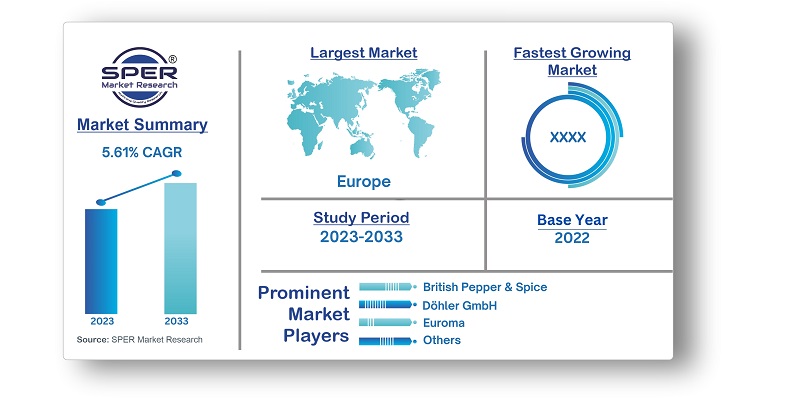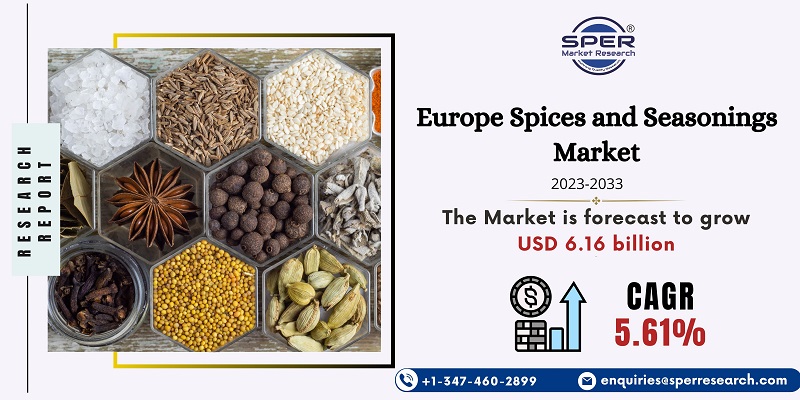
Europe Spices and Seasonings Market Growth, Size, Trends, Demand, Challenges and Future Outlook
Europe Spices and Seasonings Market Size- By Brand, By Product, By End Use - Regional Outlook, Competitive Strategies and Segment Forecast to 2033
| Published: Feb-2024 | Report ID: FOOD2423 | Pages: 1 - 152 | Formats*: |
| Category : Food & Beverages | |||
- 2022: The privately held company Kamis, with its headquarters in Poland and distribution into Russia and other regions of Central and Eastern Europe, has entered into an agreement to sell all of its shares to McCormick & Company, Incorporated, a leader in flavor globally.
- 2021: The first-ever line of seasonings based on insects and crickets was introduced by Short-Horn Super Seasonings. The product is claimed to have all nine essential amino acids, be high in protein, vitamin B12, iron, potassium, fiber, and omega-3 fatty acids, and not taste, smell, or see any crickets.


| Report Metric | Details |
| Market size available for years | 2020-2033 |
| Base year considered | 2023 |
| Forecast period | 2024-2033 |
| Segments covered | By Brand, By Product, By End Use |
| Regions covered | Germany, France, U.K., Denmark, Norway, Sweden, Rest of Europe. |
| Companies Covered | British Pepper & Spice, Döhler GmbH, Euroma, Kerry Group plc., Nedspice Group, Olam International, Prymat Group, Schwartz, Sensient Technologies Corporation, Solina, Unilever |
- Culinary Professionals
- Food Enthusiasts and Hobbyists
- Food Service Industry
- Hospitality Industry
- Importers and Exporters
- Wholesalers and Distributors
| By Brand: |
|
| By Product: |
|
| By End Use: |
|
- Europe Spices and Seasonings Market Size (FY’2024-FY’2033)
- Overview of Europe Spices and Seasonings Market
- Segmentation of Europe Spices and Seasonings Market By Brand (National Brand, Private Label Brand.)
- Segmentation of Europe Spices and Seasonings Market By Product (Herbs, Spices, Salt & Salts Substitute.)
- Segmentation of Europe Spices and Seasonings Market By End-Use (Foodservice and Retail.)
- Statistical Snap of Europe Spices and Seasonings Market
- Expansion Analysis of Europe Spices and Seasonings Market
- Problems and Obstacles in Europe Spices and Seasonings Market
- Competitive Landscape in the Europe Spices and Seasonings Market
- Impact of COVID-19 and Demonetization on Europe Spices and Seasonings Market
- Details on Current Investment in Europe Spices and Seasonings Market
- Competitive Analysis of Europe Spices and Seasonings Market
- Prominent Players in the Europe Spices and Seasonings Market
- SWOT Analysis of Europe Spices and Seasonings Market
- Europe Spices and Seasonings Market Future Outlook and Projections (FY’2024-FY’2033)
- Recommendations from Analyst
1.1. Scope of the report1.2. Market segment analysis
2.1. Research data source2.1.1. Secondary Data2.1.2. Primary Data2.1.3. SPER’s internal database2.1.4. Premium insight from KOL’s2.2. Market size estimation2.2.1. Top-down and Bottom-up approach
2.3. Data triangulation
4.1. Driver, Restraint, Opportunity and Challenges analysis4.1.1. Drivers4.1.2. Restraints4.1.3. Opportunities4.1.4. Challenges4.2. COVID-19 Impacts of the Europe Spices and Seasonings Market
5.1. SWOT Analysis5.1.1. Strengths5.1.2. Weaknesses5.1.3. Opportunities5.1.4. Threats5.2. PESTEL Analysis5.2.1. Political Landscape5.2.2. Economic Landscape5.2.3. Social Landscape5.2.4. Technological Landscape5.2.5. Environmental Landscape5.2.6. Legal Landscape5.3. PORTER’s Five Forces5.3.1. Bargaining power of suppliers5.3.2. Bargaining power of buyers5.3.3. Threat of Substitute5.3.4. Threat of new entrant5.3.5. Competitive rivalry5.4. Heat Map Analysis
6.1. Europe Spices and Seasonings Market Manufacturing Base Distribution, Sales Area, Product Type6.2. Mergers & Acquisitions, Partnerships, Product Launch, and Collaboration in Europe Spices and Seasonings Market
7.1. Europe Spices and Seasonings Market Value Share and Forecast, By Brand, 2024-20337.2. National Brand7.3. Private Label Brand
8.1. Europe Spices and Seasonings Market Value Share and Forecast, By Product, 2024-20338.2. Herbs8.3. Spices8.4. Salt & Salts Substitutes
9.1. Europe Spices and Seasonings Market Value Share and Forecast, By End Use, 2024-20339.2. Food Service9.3. Retail
10.1. Europe Spices and Seasonings Market Size and Market Share
11.1. Europe Spices and Seasonings Market Size and Market Share By Brand (2020-2026)11.2. Europe Spices and Seasonings Market Size and Market Share By Brand (2027-2033)
12.1. Europe Spices and Seasonings Market Size and Market Share By Product (2020-2026)12.2. Europe Spices and Seasonings Market Size and Market Share By Product (2027-2033)
13.1. Europe Spices and Seasonings Market Size and Market Share By End-Use (2020-2026)13.2. Europe Spices and Seasonings Market Size and Market Share By End-Use (2027-2033)
14.1. Europe Spices and Seasonings Market Size and Market Share By Region (2020-2026)14.2. Europe Spices and Seasonings Market Size and Market Share By Region (2027-2033)14.3. Germany14.4. France14.5. U.K.14.6. Denmark14.7. Norway14.8. Sweden14.9. Rest of Europe
15.1. British Pepper & Spice15.1.1. Company details15.1.2. Financial outlook15.1.3. Product summary15.1.4. Recent developments15.2. Dohler GmbH15.2.1. Company details15.2.2. Financial outlook15.2.3. Product summary15.2.4. Recent developments15.3. Euroma15.3.1. Company details15.3.2. Financial outlook15.3.3. Product summary15.3.4. Recent developments15.4. Kerry Group Plc.15.4.1. Company details15.4.2. Financial outlook15.4.3. Product summary15.4.4. Recent developments15.5. Nedspice Group15.5.1. Company details15.5.2. Financial outlook15.5.3. Product summary15.5.4. Recent developments15.6. Olam International15.6.1. Company details15.6.2. Financial outlook15.6.3. Product summary15.6.4. Recent developments15.7. Prymat Group15.7.1. Company details15.7.2. Financial outlook15.7.3. Product summary15.7.4. Recent developments15.8. Schwartz15.8.1. Company details15.8.2. Financial outlook15.8.3. Product summary15.8.4. Recent developments15.9. Senient Technologies Corporation15.9.1. Company details15.9.2. Financial outlook15.9.3. Product summary15.9.4. Recent developments15.10. Solina15.10.1. Company details15.10.2. Financial outlook15.10.3. Product summary15.10.4. Recent developments15.11. Unilever15.11.1. Company details15.11.2. Financial outlook15.11.3. Product summary15.11.4. Recent developments15.12. Others
SPER Market Research’s methodology uses great emphasis on primary research to ensure that the market intelligence insights are up to date, reliable and accurate. Primary interviews are done with players involved in each phase of a supply chain to analyze the market forecasting. The secondary research method is used to help you fully understand how the future markets and the spending patterns look likes.
The report is based on in-depth qualitative and quantitative analysis of the Product Market. The quantitative analysis involves the application of various projection and sampling techniques. The qualitative analysis involves primary interviews, surveys, and vendor briefings. The data gathered as a result of these processes are validated through experts opinion. Our research methodology entails an ideal mixture of primary and secondary initiatives.



Frequently Asked Questions About This Report
PLACE AN ORDER
Year End Discount
Sample Report
Pre-Purchase Inquiry
NEED CUSTOMIZATION?
Request CustomizationCALL OR EMAIL US
100% Secure Payment






Related Reports
Our Global Clients
Our data-driven insights have influenced the strategy of 200+ reputed companies across the globe.




















